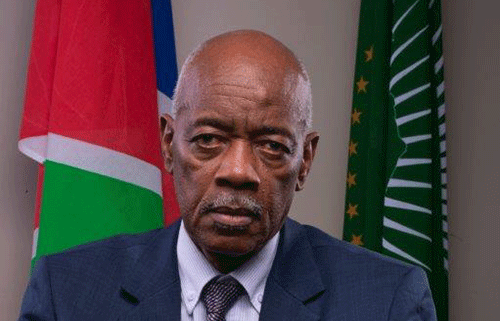For the sake of clarity, it is perhaps important to first break down the key concepts that are flagged in this heading.
Citizenship, from which the word citizen is derived, refers to a legal status and relation between an individual and a state that entails specific legal rights and duties.
Sovereignty is a political concept that refers to supreme authority. In a neo-liberal democracy like Namibia, sovereign power rests with the people, and is exercised
through representative bodies such as Parliament.
The word absolute, as an adjective, refers to a value that is not qualified, limited or that cannot, in any way, be diminished – and a norm refers to a standard or
principle of right action binding upon the members of a group and serving to guide, control or regulate proper and acceptable behaviour, according to the Merriam Webster online dictionary.
As we are preparing for the November 2024 Presidential
and National Assembly Elections, it is perhaps important to revisit some of these
concepts in the Namibian context.
It is of paramount
importance to remember that our rights-based constitution is hailed as one of the best in the world – at least as far as political rights are concerned.
In short, political rights
refer to freedom of speech, freedom of political association, etc.
Article 1 (2), under Chapter 1 of the Namibian Constitution, states: “All power shall vest in the people of Namibia, who shall exercise their sovereignty through the democratic institutions of the State”.
It is important to note that
the first two words in this paragraph are “all power”, and this must be read together with the next five words “shall vest in the people”.
Therefore, the sovereignty of the citizens hinges on these seven words in our supreme
law, the Constitution of the Republic of Namibia.
Again, the supremacy of the Constitution means no one and no law is above the Constitution.
It, therefore, follows that the sovereignty of the people, as guaranteed in the Constitution, simply means no one is above the people and the only proviso here is that this refers to the people, as a collective.
The second part of this constitutional provision reads: “…who shall exercise their sovereignty through the democratic institutions of the State….”
This means when the
citizens cast their vote to elect their leaders, they would be “…exercising their sovereignty through the democratic institutions of the State….”
In the simplest of terms,
that means the people temporarily surrender or delegate their sovereignty to their elected leaders on the
basis of a “borrowed” mandate.
In our democratic dispensation, political campaigning/electioneering is basically about two things.
The ruling party will be telling the people: “We have
put the mandate that we borrowed from you to good use, so give us five more years”.
The opposition parties will be saying to the people: “The mandate you gave to the
ruling party five years ago was not put to good use; give that mandate to us”.
I should hasten to add that there is no value judgement attached to these two hypothetical positions; except for the sake of clarifying a
point.
The people’s sacred sovereignty finds concrete expression in the secrecy of the ballot.
As a collective, the people
are sovereign, but that sovereignty is exercised privately in a ballot booth by citizens as single individual voters. The limitation to the right to vote can, for example, come about because of the
dichotomy/gap between ‘formal citizenship’ and ‘substantive citizenship’.
In terms of our Constitution and the relevant Act of Parliament, we are all ‘formal citizens’.
However, we are not all ‘substantive citizens’.
‘Substantive citizens’ are those citizens who are well-informed and empowered to claim the rights they are
entitled to as ‘formal citizens’.
Due to the lack of education and the English language handicap, the majority of our citizens may have a ‘capability deficit’, and can therefore not effectively claim their rights – including the right to vote and to hold their elected leaders to account.
It is this gap between ‘formal citizenship’ and ‘substantive citizenship’ that the ECN’s voter and civic education officers, as well as the other stakeholders, including political parties, need to fill.
However, it is imperative that the ECN’s voter and civic education officers carry out their duties in a non-partisan manner. The dichotomy between ‘formal citizenship’ and ‘substantive citizenship’ is not the only contributing factor to voter apathy.
There are other factors at play too. We, therefore, need all hands on deck to motivate our people to exercise their democratic right to vote.
The American social critic, George Carlin, once said: “If you do not vote, you lose the right to complain”.
*Gerson Uaripi Tjihenuna is a commissioner of elections. However, the views expressed here are his own and not those of ECN.


